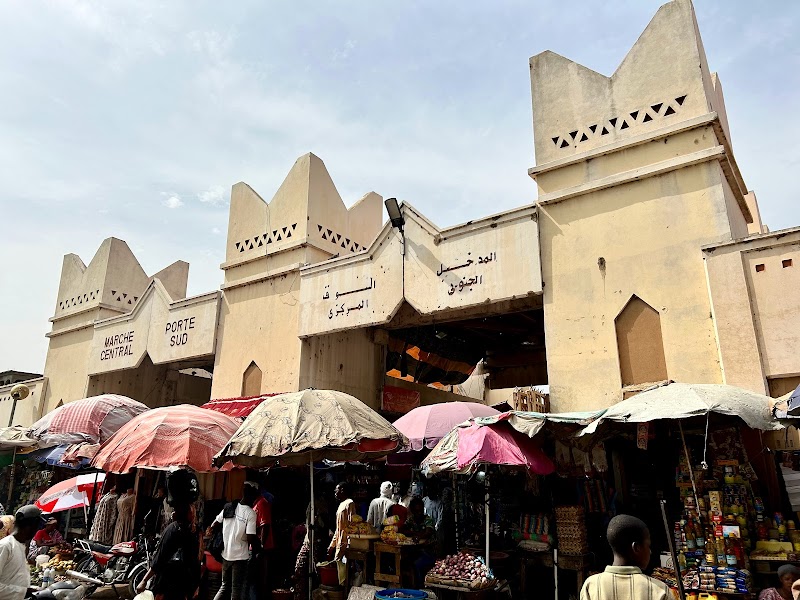
The N'Djamena Biennale transforms Chad’s capital into a living gallery, showcasing contemporary African art in unexpected urban spaces. Discover a festival where activism, creativity, and local culture collide, inviting visitors into an engaging cultural adventure unlike any traditional museum experience.
Wear Breathable, Sturdy Footwear
The Biennale venues stretch across varied urban terrain, combining dusty streets and paved alleys. Supportive shoes ensure comfort during long walking days.
Hydrate Constantly
N'Djamena’s climate is hot and dry; carrying at least 1.5 liters of water per day is advisable to prevent dehydration during your explorations.
Plan Your Schedule in Advance
The Biennale offers overlapping events and exhibitions. Check the program early and map out must-see installations to maximize your time.
Carry a Basic French Phrasebook or App
French is the official language, but local dialects dominate daily interaction. A phrasebook helps with navigation and enriching cultural exchanges.
N'Djamena Biennale: A Pulse of Artistic Adventure in Chad’s Capital
Every two years, the vibrant heart of Chad’s capital city, N'Djamena, pulses with an extraordinary creative energy during the N'Djamena Biennale. This dynamic arts festival gathers artists, curators, and explorers from across Africa and beyond, transforming urban spaces into open galleries and cultural stages. The Biennale celebrates contemporary African art through exhibitions, performances, and workshops that spill across streets, courtyards, and community centers, making the city itself an interactive canvas.
Arriving in N'Djamena during the Biennale means engaging with a rare blend of raw urban life and bold artistic expression. As you weave your way through the bustling markets and dusty avenues, installations demand your attention, daring you to question and reflect. Sculptures formed from recycled metals stand firm against the sun, while vibrant murals splash color onto concrete walls, refusing to be ignored. The city’s natural backdrop—the mighty Chari River flowing like a restless storyteller—adds a fresh breath between gallery stops.
Planning your visit around the Biennale requires some practical considerations. The festival lasts several weeks, providing enough time to experience the main exhibitions and fringe events. Comfortable walking shoes are essential; the pathways vary from paved streets to sandy patches, blending the urban with the semi-rural texture of N'Djamena’s outskirts. Hydration is critical here—the Sahel sun is relentless, coaxing you to carry water and sun protection.
Despite the urban setting, the Biennale encourages a respectful navigation of spaces fiercely alive with local culture and history. Vendors selling traditional crafts and spices extend an invitation to engage beyond the art, offering an authentic taste of Chadian life. Language may be a challenge—French is official, but local dialects color everyday conversations—so a phrasebook or translation app can smooth interactions.
The Biennale’s schedule often includes talks and workshops, a perfect chance to connect deeply with artists and themes. Tickets and access points are usually affordable and well-distributed, but early research pays off, ensuring you don’t miss marquee events. Nighttime in N'Djamena shifts gear as live music carries on under lantern-lit streets, the city’s rhythms a fitting encore to the day’s artistic encounters.
The N'Djamena Biennale is not just a festival; it’s an invitation to engage with art as an exploratory journey through Chad’s cultural and social canvas. It blends the practical with the poetic, revealing a city fiercely itself—raw, evolving, and unapologetically vibrant.
Nearby Trips
All Adventures
Boat Charters
Water Activities
Adventures near N'Djamena, Chad
Discover the unique and memorable adventures that make N'Djamena, Chad special.
Frequently Asked Questions
When exactly does the N'Djamena Biennale take place?
The Biennale occurs every two years, typically during the dry season from November to February, but dates can vary. Checking the official festival website or local announcements before planning is recommended.
Is the Biennale suitable for casual visitors or only art experts?
The festival balances both: casual visitors enjoy vibrant street art and community events, while seasoned art enthusiasts can attend curated exhibitions and in-depth workshops.
Are there safety concerns for tourists exploring N'Djamena during the Biennale?
N'Djamena is generally safe during festival events, but standard urban safety precautions apply: stay in well-traveled areas, avoid walking alone at night, and keep an eye on personal belongings.
What local cultural experiences are integrated with the Biennale?
Local crafts markets, traditional music performances, and food stalls are woven into the festival atmosphere, offering visitors authentic encounters alongside contemporary art.
Can visitors meet and interact with artists?
Yes, the Biennale encourages community engagement, hosting talks, workshops, and live demonstrations where visitors can connect with creators.
What languages will I hear, and how do I manage communication?
French is the official language used in festival signage and events, but many locals speak Arabic and various indigenous dialects. A basic French phrasebook or translation app is helpful.
Recommended Gear
Comfortable Walking Shoes
Durable shoes that breathe and support your feet through extended urban exploration.
Wide-Brimmed Hat
Protects from harsh sun exposure during long outdoor walks in the dry season.
Reusable Water Bottle
Keeps you hydrated and reduces plastic waste as you traverse the city.
Compact Umbrella or Lightweight Rain Poncho
Useful during unexpected rain showers in the wet season for staying dry between events.
Local Insights
Hidden Gems
- "The mural-covered walls near Avenue Félix Eboué, less frequented but rich in street art."
- "Small artist-run cafes offering intimate exhibitions off the main Biennale route."
Wildlife
- "Watch for the colorful bee-eaters and black kites soaring overhead near the river."
- "Local bats emerge at dusk, adding an unexpected natural show alongside the urban buzz."
History
"N'Djamena grew as a colonial French outpost before becoming Chad's capital. The Biennale often reflects its post-colonial identity, fostering dialogues on heritage and contemporary African realities."
